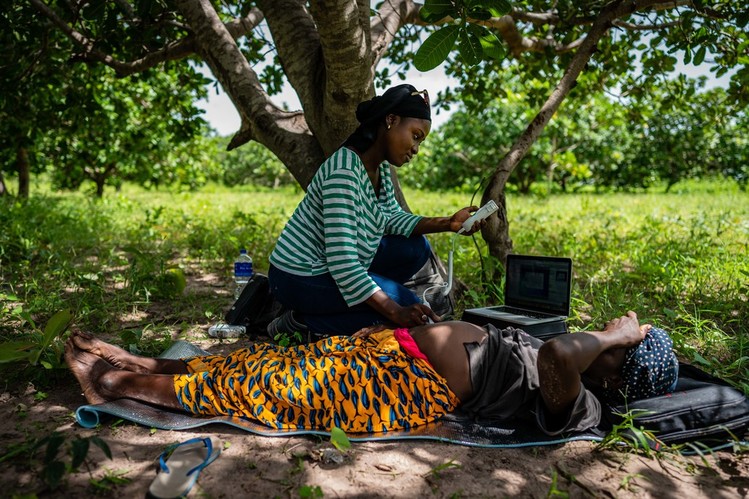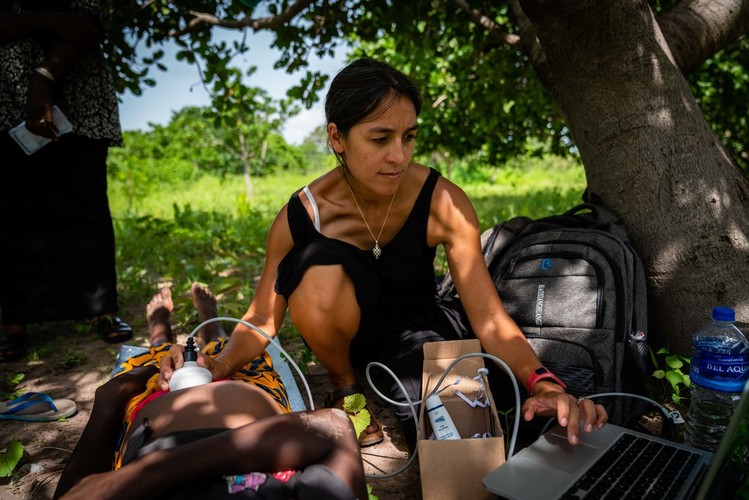Impact of climate emergency on pregnant women explored thanks to £2m funding
“Pregnant women are especially vulnerable to the health impacts of extreme heat”
A group of 700 pregnant women in The Gambia will be studied as part of a collaborative research project examining how high temperatures where they live affect them and their babies.
One of the leaders of the four-year study is Amanda Sferruzzi-Perri, Professor in Fetal and Placental Physiology at the University of Cambridge and a Fellow of St John’s College.
The £2m Wellcome Trust grant will enable Professor Sferruzzi-Perri and a team of researchers from the Medical Research Council Unit The Gambia (MRCG) at the London School of Hygiene & Tropical Medicine (LSHTM) to evaluate exactly what happens when pregnant women endure extreme heat. They want to discover how it affects women, foetuses, and babies and at what temperature.

Professor Sferruzzi-Perri said: “We know that exposure to elevated temperatures for prolonged periods in pregnancy increases the risk of complications like high blood pressure in the mother, stillbirth and small babies but we don’t yet know how that occurs. We think it is largely due to the inability of the mum to properly manage and regulate her body temperature when she is exposed to extreme heat and the foetus is also producing extra heat of its own.
“The placenta is sensitive to environmental cues and we want to find out if the extreme heat is resulting in the placenta shutting off important functions like nutrient transport to conserve energy, which has an adverse effect on the unborn baby.”
This project builds on previous pilot work by MRCG exploring the maternal and foetal physiological impact of extreme heat in pregnant subsistence farmers in The Gambia. They found that there was evidence of alteration in placental blood flow with increasing heat exposure and evidence of foetal strain.
Assistant Professor Ana Bonell, the MRCG lead, said: “The Gambia is at the forefront of the climate crisis despite contributing almost nothing to the problem. Pregnant women are especially vulnerable to the health impacts of extreme heat, but in order to develop effective adaptation strategies we need to understand both important biological pathways and locally sustainable and appropriate interventions, which this project aims to do.”
“This study will be really valuable in understanding how climate change impacts the mother and her unborn child”

Environmental heat exposure during pregnancy is already known to cause nausea, vomiting, headaches, dizziness and fatigue in expectant mothers, and can lead to multiple adverse birth outcomes. During pregnancy, changes occur in the body that affect its ability to regulate temperature.
The team of international scientists, which includes many from The Gambia, will collate and analyse evidence of maternal responses to heat exposure, to identify the specific biological pathways affected and to determine the thresholds for which heat stress results in physiological changes. Many of the women taking part in the study have jobs or family responsibilities that require them to work in outdoors in high temperatures without shade. The study is designed to compare those exposed to the cooler conditions at the coast versus the hotter interior (both in rural areas and in the city).
A further study in a controlled heat chamber will recruit groups of pregnant women exposed to different temperatures and exercise levels in Greece and The Gambia, to study different populations and give in-depth details on the physiological responses to heat stress.
All the women and their babies will be monitored during pregnancy and Professor Sferruzzi-Perri will lead the analysis of their placentas post-birth to explore the impact of these living and working conditions. Research has already shown that the unborn children of women working in extreme heat can show signs of strain before their mothers are affected.
Professor Sferruzzi-Perri said: “This study will be really valuable in understanding how climate change, namely heat exposures, impacts the mother and her unborn child. We know some women and their babies are more at risk due to their living and working conditions and we want to identify why that is the case, and what temperatures become particularly dangerous at sparking adverse pregnancy outcomes.
“Our hope is that policymakers can use the research to drive forward change and help mitigate or ideally halt the impact on pregnant women of high temperatures.”
Learn more about The Gambia Heat in Pregnancy Study
Published 5/2/2024